The end of the 2017-2018 academic year also marks the end of four influential careers at Hampden-Sydney College. As we say goodbye to our retiring professors—a dynamic husband-wife duo, a celebrated artist, and a dedicated mathematician—we asked them to reflect on their time at Hampden-Sydney. What emerged were the highlights of a combined 138 years of service. It is difficult to see such devoted faculty members go, but their impact will long be felt through the students they taught. We wish them well as they look to the future—which, not surprisingly, includes travel for all four.
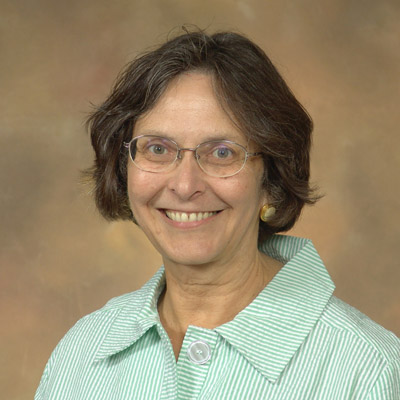
Dr. Elizabeth J. Deis
Elliott Professor of Rhetoric and Humanities
Time at H-SC: 35 years
Campus Involvement: I helped a student begin the Future Educators Club and then worked closely with that club throughout most of my years at H-SC. We brought alumni working in different educational fields back to campus to meet with students interested in pursuing some career in education. I also worked with students in the leadership honor society, Omicron Delta Kappa. During this time I helped them start and maintain the "H-SC Cares for Kids" project, which seeks to help children in need from the local community.
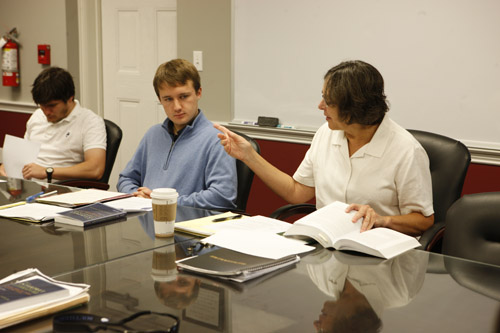
Lessons Taught: I focused on teaching my students to read more carefully and with more interest than they had prior to my class and hope that they learned some strategies for writing clearly, concisely, and effectively. I also hope that they learned to consider literary texts within and against the background of the historical and political culture in which the author lived and worked.
Lessons Learned: I have learned that a professor cannot always predict or control everything that happens in class discussions and that being flexible can allow for the development of really special and important classroom moments.
Favorite Class: It's hard to name any classes that I did not enjoy teaching. Creative Nonfiction students are highly motivated to improve their writing. They choose to work on very complex essays and the quality of their work is almost always terrific. Gender and Communication—a class that spent a couple weeks tutoring students at Prince Edward County High School and took notes on those students' approach to writing tasks—was an enjoyable rhetorical theory class as well.
Favorite Memory at H-SC: My favorite memory is from the 2017 Commencement ceremony when Lowell and I received the senior class award. It was the best feeling to be selected by the students themselves.
Greatest Accomplishment: Helping persuade the Rhetoric staff and then the faculty as a whole to pass the Rhetoric Minor. Students had been asking for more advanced Rhetoric classes, and it has been gratifying to see the minor become so popular.
Retirement Plans: I plan to complete some research projects, and am excited about the possibility of traveling various places. I am perhaps most excited to have the time to learn to play the mandolin and to read books that aren't necessarily related to classes or research projects.
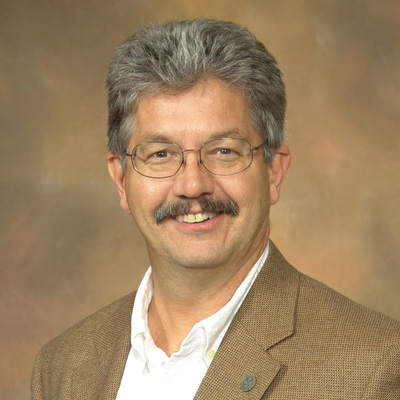
Dr. Lowell T. Frye
Elliott Professor of Rhetoric and Humanities
Time at H-SC: 35 years
Campus Involvement: During my years at Hampden-Sydney, I have been involved with the Omicron Delta Kappa honor society, the Phi Beta Kappa honor society, and the Society of Collegiate Journalists. For several years I served as faculty advisor to the Tiger and for a time Elizabeth and I were joint advisors of UPLS, the College's literary society.
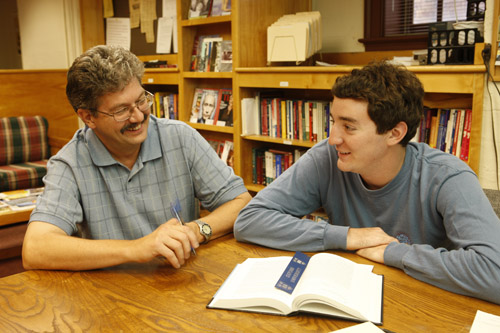
Lessons Taught: I hope that my students have taken away an appreciation of the riches of the English language, but even more that they have the capacity in them to improve as readers and writers. Writing well is a craft that demands considerable effort over time: capable writers are made, not born. In literature courses, I hope that students take away the capacity to immerse themselves in fictional or poetic worlds and therefore to understand why reading matters in the making of a good man and a good citizen.
Lessons Learned: Perhaps a chief lesson as a teacher at H-SC comes from talking with alumni whom I taught years before: very often what I have considered the most important thing I have done in a class is not what my former students remember as particularly important. I have learned again and again that an education in the liberal arts has more to do with the growth and development of young people than it does with a particular body of knowledge or information. I value greatly what I teach, but I cherish especially those whom I teach.
Favorite Class: I can honestly say that I have liked all the courses I have taught over the years—in rhetoric, literature, western culture, honors. I am very fond of Rhetoric 301: Creative Nonfiction, where I found great pleasure in helping students explore in their portfolios of essays who they are and what they believe. I also love teaching Rhetoric 360: Rhetorical Traditions, which offers the opportunity to help students understand the long history of rhetoric from ancient Greece to the present and so to help them understand how and why H-SC's Rhetoric Program came into being.
Favorite Memory at H-SC: For fourteen years, Misty Blue, our long-haired Chihuahua, was a regular in the Writing Center. Before any consultation could occur, students who came to my office first had to greet Misty Blue and pet her. I can honestly say that hundreds of H-SC students got to know Misty Blue, and many of them would come by my office especially to visit her—conversation about their writing was merely an excuse to visit with the dog! Misty, and still more her interactions with students, came to symbolize nebulously for me something important about the community at H-SC, and my memories of the place and the education and the students will always be intertwined with my memories of that little dog.
Greatest Accomplishment: I am most proud that Elizabeth and I have found a way to build a joint career here at H-SC, and that we have had a role in sustaining and growing the Rhetoric Program over the past thirty-five years. The founders and early participants (let me shout out here particularly to Mary Saunders and Wayne Tucker and Larry Martin and George Bagby) did a wonderful job of getting the Rhetoric Program up and running. That the Rhetoric Program here has lasted—and thrived—through forty years is highly unusual, and we are proud to have contributed to that
Retirement Plans: Following retirement, Elizabeth and I expect to travel—to visit our children, but also to visit places abroad that appeal to us. We will continue to read and write, of course, and hope to bring various writing projects to completion in the next several years. We are very excited at the prospect of spending more time at our house on the coast of North Carolina. (The mailing address is in Bolivia, NC—so we can say we may retire to Bolivia!)
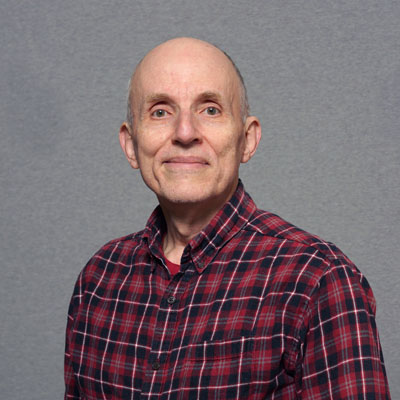
David Dodge Lewis
Barger-Barclay Professor of Fine Arts
Time at H-SC: 31 years
Choosing the profession: An artist needs a reliable alternative income, and academia runs in the family. My parents valued education highly, especially in the liberal arts.
Campus Involvement: I connected with students outside of the club format: For a while I wrote a regular column for the Tiger; when I chaired Lectures & Programs, I hired a band of students for making and putting up posters; and over the years, I was part of the team that presented exhibitions on campus, including student shows. The latter culminated in getting a gallery in the renovated art center, one of my pet projects for the new building.
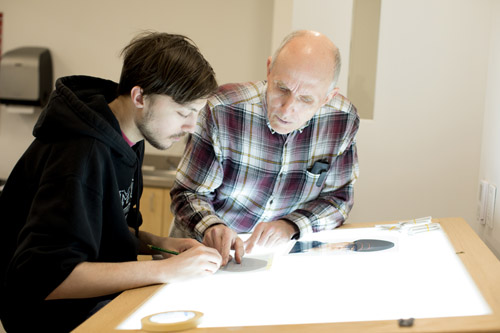
Lessons Taught: We see before we learn to speak, which links us all across cultures. Art is a way of organizing this most fundamental and precious sensation, and to communicate more directly than in perhaps any other medium. But it takes some real effort both to see, and to respond to what we see, coherently. As a first step, I hope my classes helped students to see more coherently.
Secondly, since being a visual artist usually means working alone, I hope I have encouraged students to develop their skills and thinking beyond the class. Too often the collective wisdom divides the world into leaders and followers, but I believe the rugged individualist is equally important in moving civilization forward.
Lessons Learned: There are too many lessons I have learned to be able to list them all. I do believe focusing on introductory level courses has made me more confident in the basics, as well as how to get them across clearly and simply without being patronizing.
Favorite Memory at H-SC: I like kidding with students. In one drawing class I had a student say, "By the end of the semester, I want to be drawing as well as you do." I thought about it, then answered, "Well, I could drop a rock on my hand."
Greatest Accomplishment: While getting a renovated fine arts facility was a group project at every level and every step of the way, it required convincing a lot of people and building a program that could make full use of such a space. I was the stuck record that repeated, over and over again, the need for such a space, so I have been happy to spend my final year in the exceptional new facility.
Retirement Plans: I plan to move to Maine, where I grew up and where my wife and I both have family. What we are both most excited about, after family, is living by the ocean again.
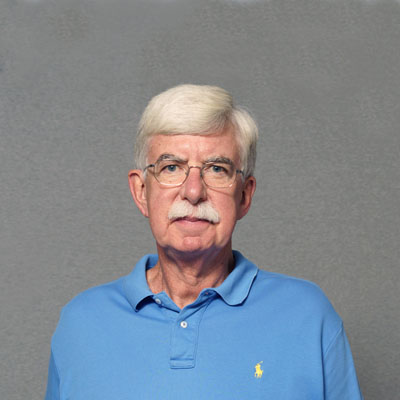
Dr. David S. Pelland
Associate Professor of Mathematics & Computer Science
Time at H-SC: 37 years
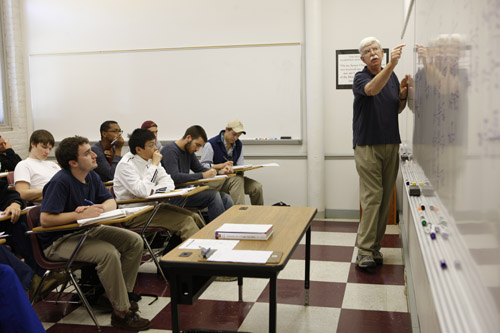 Campus Involvement: I've advised the math club and the College's chapter of Pi Mu Epsilon, a math honorary society. I also served as the Secretary-Treasurer for the Hampden-Sydney's chapter of the Phi Beta Kappa honor society for several years.
Campus Involvement: I've advised the math club and the College's chapter of Pi Mu Epsilon, a math honorary society. I also served as the Secretary-Treasurer for the Hampden-Sydney's chapter of the Phi Beta Kappa honor society for several years.
Lessons Taught: I wanted my students to learn critical thinking and problem solving skills. They always can look up the technical details necessary to solve a problem if they understand the big picture.
Lessons Learned: I learned the importance of changing my teaching approach to suit the various generations of students over the years.
Favorite Class: My favorite class was Differential Equations because it required students to apply what they learned in their calculus and linear algebra classes to solving problems.
Favorite Memory at H-SC: I loved the 1999-2000 Division III national basketball championship game between Hampden-Sydney and Wisconsin-Platteville. Even though H-SC lost 76-75 in overtime, it was the most exciting Tiger basketball game I've seen in 37 years. Greatest Accomplishment: It was an honor to be recognized for both my teaching and for my work in administration by receiving the College's Cabell Award for Distinguished Teaching and the Thomas Edward Crawley Award for Distinguished Service.
Retirement Plans: My wife and I plan to continue living on campus. We value being part of the College community and being able to attend the cultural and athletic events on campus. We're most excited, however, about having more time to travel.